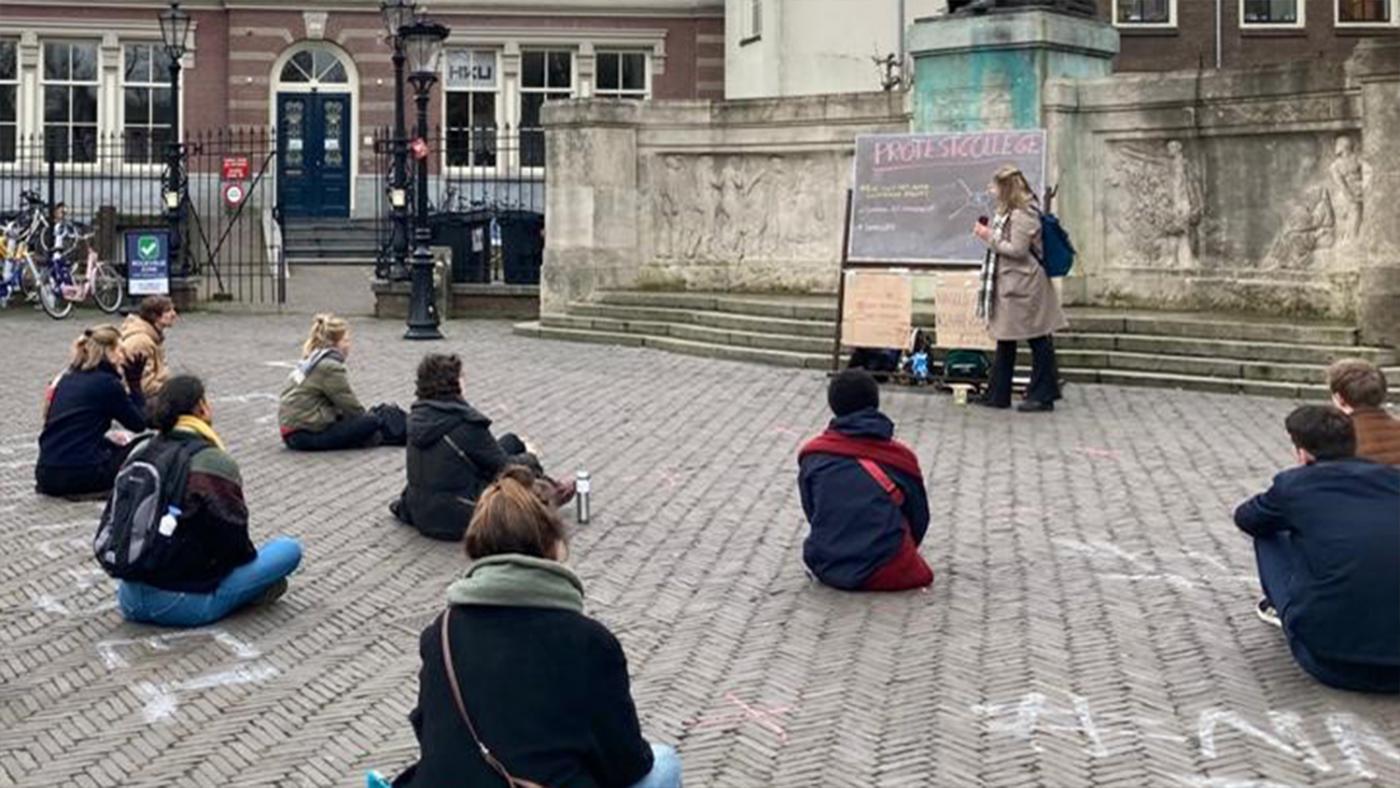UU's corona commission: situation will go back to normal in the next academic year

It is extremely likely that the Dutch cabinet will remain strict in its next press conference on Tuesday, but there's an end in sight for the situation of students and teachers working exclusively from home.
Titled "Utrecht University open again", the advice note (which can be read here with your Solis-ID) was penned by a comission led by epidemiologist Hans Heesterbeek and joined by coronavirus experts such as Patricia Bruijning and Cécile van Es, as well as prominent behavioural scientists like psychologist Denise de Ridder and sociologist Tanja van der Lippe. The document outlines how educational and research activities can be resumed on campus in a safe way.
Reservating lectures
According to the note, the Executive Board must get ready right away for a future in which the vast majority of Dutch people will be vaccinated. The commission expects several restrictions to be lifted by the end of the summer, and measures such as the 1.5-metre social distancing rule and the public transport reductions to be phased out.
Therefore, most classes can be scheduled as usual in the first block of the next academic year. The commission makes an exception for large-scale lectures with more than a hundred attendants, because students will probably be the last ones to be vaccinated.
Less restrictions in the summer already
However, the commission recommends the University not to wait until the next academic year to offer teachers and students more possibilities besides studying and working online. They argue that, up until now, all measures related to higher education aimed to limit the virus' transmission rate and protect the people at increased risk for severe illness from Covid-19. With more and more people getting vaccinated in the coming months, they expect the University to have more room for easing restrictions.
UU can, therefore, offer a light at the end of the tunnel for students and teachers who are sick and tired of the current situation. The standard answer to those asking for more flexibility and pragmatic solutions can go from "no, unless..." to "yes, as long as..."
Uncertainty levels
In a note sent to the Executive Board earlier this month, the commission said it expected universities to be able to allow activities on location by April, echoing what the Dutch government stated in a press conference. The University then followed with an e-mail to all students and staff informing them of this expectation. However, if the rumors coming from The Hague last weekend turn out to be true, then we will have to wait a little longer.
The commission's advice note underscores the high level of uncertainty, comparing the journey from now to September or October to a train ride with several stops. The first station is when few people are vaccinated, so the rules have to be strict; and the final station is after the summer, when almost everybody is vaccinated and most restrictions can be lifted. The stops in between represent the different stages of vaccination, with increasing freedoms. We just don't know exactly when the train will reach each of those stops, because that depends on the infection risks and how the virus behaves.
Room for social activities
Once the government gives its green light, the University must prioritise social activities, such as gatherings organised by student associations. Additionally, teachers and study programmes must be encouraged to come up with pragmatic solutions to enable education face to face. Before the summer, all students should have at least one educational activity on campus every week. The commission also supports the use of theatres and event venues such as Tivoli.
The employees should also return to the university at least one day a week, the committe recommends. Departments should arrange this themselves, as they see fit, provided that they respect the regulations in place. After all, students and employees are eager to meet each other again.
Rapid tests have limited effect
The more people get vaccinated, the more the University will be able to provide. The commission expects most research and support staff to work on campus at least 75 percent of the time.
They reject the idea that rapid tests could make the train move faster, claiming it is not realistic to think that the UU could resume its educational activities in the short term thanks to a massive use of such tests. That would require a major logistical operation.
What the commission does do is suggest the employment of a working group to analyse whether rapid tests can enable incidental meetings that would otherwise not be possible because of the Covid-19 restrictions. From block 1 of the next academic year, rapid tests could eventually be used before large-scale lectures with more than a hundred students.
In the spring: minimal vaccination rate and serious infection rate
-Small-scale social activities at the university
-Students have one educational activity per week on location
-Employees work one day a week at the university
-Public transport restrictions
---------------------------------
In the summer: vaccination rate halfway and worrisome infection rate (bear in mind that very few educational activities take place in the summer)
-Activities with no more than 50 people
-Students on campus two days a week
-Possible restrictions on the duration of meetings or designated workspaces
-Employees in the office half of the time
-Public transport restrictions
Or
In the summer: vaccination rate halfway and infection rate vigilant
-Activities with no more than 100 people
-75 percent of educational activities allowed to continue
-Employees can spend 75 percent of the time at the office
-No restrictions to public transport
------------------------------------
In the autumn: maximum vaccination rate and infection rate vigilant
-All educational and research activites allowed
-No public transport restrictions